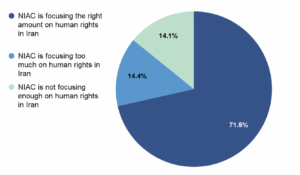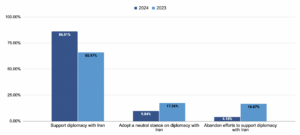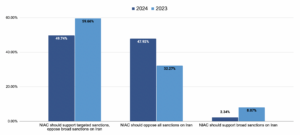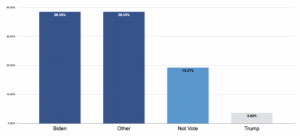NIAC & NIAC Action
2024 Annual Member Survey
The policies and priorities of the National Iranian American Council have been determined by our volunteers and donors for more than two decades. This has given the organization its strength and helped guide its people-powered mission and voice from its founding to its present.
This year’s survey comes amid a turbulent year. A brutal war between Israel and Palestine has roiled the Middle East since October, with tens of thousands already killed and many more at risk of dying from famine and bombardment. Across the region, tensions remain on a knife’s edge, with the U.S. undertaking bombings in Iraq, Syria and Yemen in response to the actions of various militias. War hawks are criticizing Biden’s response as weak for avoiding striking Iran directly, which would risk plunging both parties into a full-blown regional war. In Iran, conservatives and hardliners remain firmly ensconced in power, with moderate and reformist voices isolated from power and the government more delegitimized than ever before. In the U.S., an “Uncommitted” movement has launched in tandem with calls for a ceasefire, sending a powerful political signal that this war must stop or Biden could lose his reelection campaign.
The results of this survey will guide our work to serve our members and uphold our mission to build civic power for Iranian Americans and allies to advance peace and diplomacy, secure equitable immigration, and protect civil rights. This year NIAC received approximately 400 survey results; a summary of the results and our takeaways from this important survey follow.
Survey Results Executive Summary
- Respondents ranked preventing war between the U.S. and Iran (#1) and securing a ceasefire between Israel and Palestine (#2) as their top priorities for NIAC. These two priorities are deeply interlinked, as the conflict between Israel and Palestine has threatened to spill over into a full-blown war between the U.S. and Iran. Our work on ceasefire has been dictated by necessity, and was not an option in last year’s survey. Last year, defending civil rights of Iranian Americans (#5) was the second ranked priority.
- Rounding out the top five priorities this year, respondents ranked relieving broad economic sanctions that hurt Iranians (#3), support diplomacy between the U.S. and Iran (#4) and defending civil rights of Iranian Americans (#5). All of these priorities received similar levels of prioritization.
- Nearly 72% said they are “very concerned” about threats to civil rights and immigration restrictions of Iranians. 24% registered that they are “somewhat concerned” while only 4% indicated they are “not concerned.” These figures are nearly identical to the response on this question from last year.
- More than 71% say that NIAC has been focusing the right amount on human rights in Iran. 14% said we are not focusing enough and 14% said we are focusing too much. Advocating for human rights in Iran ranked sixth in our respondents’ prioritization of issues.
- 86% say NIAC should continue to support U.S. diplomacy with Iran, a significant jump from last year when 68% voted to support a resumption of diplomacy. 10% of respondents say NIAC should adopt a more neutral stance on diplomacy, compared to 17% last year; and 4% say NIAC should abandon supporting diplomacy, compared to 14% last year
- 49.7% say NIAC should support targeted sanctions and oppose broad sanctions, as has been our longstanding position, while 47.9% say we should oppose all sanctions. 2.3% say we should support broad sanctions. This reflects broader opposition to all sanctions from last year, when 60% supported targeted sanctions and opposition to broad sanctions while 32% opposed all sanctions.
Ranking Priorities of the Organization
1) Please rank your top 5 priorities for NIAC Action this year, with 1 being the top priority
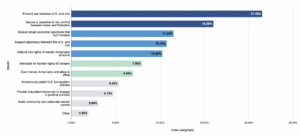
Preventing war between the U.S. and Iran was once again the top priority with forty more “top priority” votes than any other focus.
Securing a ceasefire between Israel and Palestine ranked second, well above the remaining top five priorities of relieving broad sanctions, supporting diplomacy and defending the civil rights of Iranian Americans in the US.
Additional priorities that were ranked included advocating for the human rights of Iranians (#6) electing Iranian Americans and allies to public office (#7), advancing equitable U.S. immigration policies (#8), providing education and resources for Iranian Americans to engage in the U.S. political process (#9), and building community and celebrating Iranian culture (#10).
Civil Rights
2) How concerned are you by threats against the civil rights of Iranian Americans, such as state and federal “land law” bills to restrict property ownership on the basis of Iranian heritage, Congressional proposals to ban travel to Iran, or the prospect of a new Muslim Ban being implemented if Trump returns to the White House?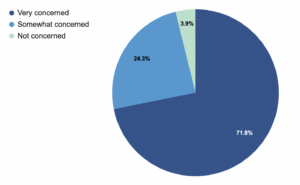
Nearly 72% said they are “very concerned” about threats to civil rights and immigration restrictions of Iranians. 24% registered that they are “somewhat concerned” while only 4% indicated they are “not concerned.” These figures are very close to the totals from last year.
Unfortunately, the results show that many threats to civil liberties persist and continue to impact or threaten the community. This includes continued bank account closures and restrictions impacting our community, the rise of new alien land laws being implemented in states like Florida and being proposed federally, and the continued political strength of Donald Trump who has threatened to expand on the Muslim ban that divided Iranian and other communities in his term in office.
Human Rights
3) Do you support NIAC’s work to spotlight human rights in Iran and advocate for U.S. policies in support of human rights in Iran?
More than 71% say that NIAC has been focusing the right amount on human rights in Iran. 14% said we are not focusing enough and 14% said we are focusing too much. Advocating for human rights in Iran ranked sixth in our respondents’ prioritization of issues.
This continues to be a difficult balance to strike, as the human rights situation in Iran has continued to deteriorate in recent years and some outside Iran seek to weaponize these abuses to promote more sanctions and military action that would exacerbate human suffering. Amid the Woman, Life, Freedom movement, NIAC intensified its important work to spotlight rights abuses on the ground and advocate for concrete steps that support – rather than further harm – the people of Iran. Even as the protest movement has receded from the streets, we have continued to track important developments via our Human Rights Tracker and Iran Unfiltered, shining a light on the human rights situation for both policymakers and the general public alike. While we are a U.S. organization and thus only directly advocate for U.S. government policies regarding human rights, we plan to continue doing everything we can to shine a light on abuses and push forward U.S. policies that support – rather than further harm – the people of Iran as they continue to struggle for rights and dignity.
Diplomacy
4) What best matches your opinion on how NIAC should approach diplomacy and the risk of war with Iran?
86% say NIAC should continue to support U.S. diplomacy with Iran while just under 10% say NIAC should adopt a more neutral stance. 4% say NIAC should abandon supporting diplomacy. This marks a jump from last year, when 69% supported a resumption of diplomacy with Iran while 14% urged abandoning diplomacy.
Preventing war has long been a priority for our membership, and diplomacy remains an indispensable tool to achieving this outcome. Last year, the regional security situation was comparatively stable as anti-regime protests loomed large. However, the war in Gaza has revived fears of a direct war between the U.S. and Iran, which may explain the increase in support for diplomacy.
This past year, NIAC was vocally supportive of the backchannel negotiations that led to freedom for five Iranian Americans and the release of Iranian restricted assets for the purchase of food and medicine. Backchannel diplomatic efforts also appear to have played a vital role in preventing direct conflict since October, though higher-level diplomatic goals beyond deconfliction and the immediate crisis in Gaza are likely to wait for 2025 or later.
Whatever the circumstances, NIAC will continue to be guided by its members and grassroots supporters.
Sanctions
5) What is closest to your view on NIAC and its advocacy around sanctions?
49.7% say NIAC should support targeted sanctions and oppose broad sanctions, as has been our longstanding position, while 47.9% say we should oppose all sanctions. 2.3% say we should support broad sanctions. This reflects broader opposition to all sanctions from last year, when 60% supported targeted sanctions and opposition to broad sanctions while 32% opposed all sanctions.
Those who are aware of the impact of U.S. sanctions undoubtedly recognize their role in exacerbating the economic plight and human rights of ordinary Iranians. Regrettably, but for the brief window when many broad sanctions were lifted as part of the nuclear deal, broad sanctions have been the consistent norm of U.S. policy. Their imposition is directly linked to sky-high inflation in Iran, which has hovered at or above 40% for years and pushed millions out of the middle class, undermining the grassroots movement for democracy and human rights.
Interestingly, the near equal totals in support of targeted sanctions and opposing all sanctions does merit further discussion and debate. While we see merit in imposing costs on rights abusers in the Iranian government, which would be far more impactful if the Iranian economy wasn’t entirely sanctioned several times over, there is also a strong argument that the entire edifice of sanctions on Iran is damaging, irrespective of the merits of individual designations. We will continue to analyze this issue and, if necessary, refine our approach in line with our community and members.
Elections
6) What would you like to see NIAC Action prioritize for the 2024 Election?
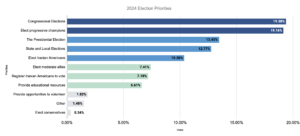
Despite 2024 being an election with the Presidency on the line, respondents prioritized both Congressional elections and electing progressive champions over the Presidential race. This likely reflects widespread dissatisfaction among our constituency with many of the foreign policy priorities enacted by President Biden, as will be discussed in the following section.
Moreover, we have seen many progressive champions who have been vocal in opposing war and sanctions with Iran and who have called for a ceasefire in Gaza targeted by rightwing and hawkish Israel-aligned groups. This includes the American Israel Public Affairs Committee touting a $100 million war chest to target and defeat lawmakers critical of Israel or supportive of ceasefire. As a result, this election could once again be critical in shaping the willingness of public officials to listen to constituents who want them to be vocally opposed to fueling war.
7) If the general election were today, who would you vote to serve as President of the United States?
In 2020, NIAC Action members voted by a margin 85% for the organization to endorse Joe Biden. While the Biden administration has followed through on some of its commitments to us, notably repealing the Muslim ban on Day One, it is indisputable that Biden has lost significant support among our members.
Today, an equal percent of respondents say they will vote for “Other” as say they would vote for Joe Biden – 38.5%. If we combine those who indicated “Other” or that they would decline to vote, a majority of respondents – more than 57% – would not vote for either of the two major party candidates. Donald Trump, meanwhile, received less than 4% of support from respondents.
It’s hard to escape the conclusion that Biden has lost significant support due to his support for Israel’s efforts in Gaza and has failed to deliver on key commitments, like restoring the nuclear deal, and instead continued Trump-era maximum pressure policies and efforts to secure normalization deals with Israel. This papered over the seeds of conflict and paved the way to the disastrous war between Israel and Gaza, which still threatens to spill across the region.
If Biden wants to regain the trust of some of these voters, he is going to have to start with securing a permanent ceasefire and revisiting his commitment to lead through diplomacy, not U.S. bombs and diplomatic cover.
8) The top 3 factors that will decide whether I vote for a candidate is their:
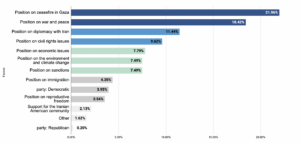
Respondents ranked position on ceasefire in Gaza (#1) as their top priority in determining whether they would vote for a candidate for office, followed closely by a candidate’s position on war and peace (#2). This reflects a strong emphasis from our community across the board on stopping the war between Israel and Palestine and preventing a new, full-blown war from erupting between the U.S. and Iran. Respondents ranked position on diplomacy with Iran (#3) and position on civil rights issues (#4) as their next priorities. Of course, our community is not a monolith and there are many other priorities our members use in evaluating candidates.
Back to top